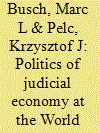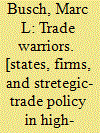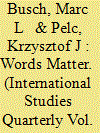|
|
|
Sort Order |
|
|
|
Items / Page
|
|
|
|
|
|
|
| Srl | Item |
| 1 |
ID:
094086


|
|
|
|
|
| Publication |
2010.
|
| Summary/Abstract |
The landscape of the global economy is dotted with institutions that regulate investment and trade. in recent years, the number of bilateral investment treaties (BITs) and preferential trade agreements (PTAs), in particular, has grown at a torrid pace; practically every country is a member of at least one-if not many-of these institutions. For all the scholarly attention that these institutions have received, however, there is little research tying BITs and PTAs together. this is surprising, since both aim to increase commerce by making it more predictable. The authors seek to fill this gap in the literature. They argue that a BIT between a developed and a developing country should make it more likely that this pair of states will subsequently form a PTA. that said, the wrinkle in the story is that more is not better in this regard; the authors further argue that a developing country that has many BITs is less likely to conclude a PTA with a wealthy state. The authors test these hypotheses using annual data on pairs of developing and developed countries between 1960 and 2004 and find strong evidence in support of their argument.
|
|
|
|
|
|
|
|
|
|
|
|
|
|
|
|
| 2 |
ID:
080047


|
|
|
|
|
| Publication |
2007.
|
| Summary/Abstract |
Preferential trade agreements offer members an alternative to dispute settlement at the World Trade Organization. This gives rise to forum shopping, in that complainants can file regionally, multilaterally, or not at all. What explains this choice of forum? I argue that complainants strategically discriminate among overlapping memberships: on a given measure(s), some prefer to set a precedent that bears only on a subset of their trade relations, others a precedent that bears on all their trade relations, while still others prefer not to set a precedent. Thus, the key to forum shopping is not simply which institution is likely to come closest to the complainant's ideal ruling against the defendant, but where the resulting precedent will be more useful in the future, enabling the complainant to bring litigation against other members, rather than helping other members bring litigation against the complainant. I consider disputes over Mexican brooms and Canadian periodicals
|
|
|
|
|
|
|
|
|
|
|
|
|
|
|
|
| 3 |
ID:
095024


|
|
|
|
|
| Publication |
2010.
|
| Summary/Abstract |
International institutions often moderate the legal decisions they render. World Trade Organization (WTO) panels do this by exercising judicial economy. This practice, which is evident in 41 percent of all rulings, involves the decision not to rule on some of the litigants' arguments. The constraint is that it can be appealed. We argue that panels exercise judicial economy when the wider membership is ambivalent about the future consequences of a broader ruling. This is proxied by the "mixed" (that is, nonpartisan) third-party submissions, which are informative because they are costly, jeopardizing a more decisive legal victory that would benefit these governments too. We empirically test this hypothesis, and find that mixed third-party submissions increase the odds of judicial economy by upwards of 68 percent. This suggests that panels invoke judicial economy to politically appease the wider WTO membership, and not just to gain the litigants' compliance in the case at hand.
|
|
|
|
|
|
|
|
|
|
|
|
|
|
|
|
| 4 |
ID:
076166


|
|
|
| 5 |
ID:
053451


|
|
|
|
|
| Publication |
Cambridge, Cambridge University Press, 2001.
|
| Description |
x, 213p.
|
| Standard Number |
0521799384
|
|
|
|
|
|
|
|
|
|
|
|
Copies: C:1/I:0,R:0,Q:0
Circulation
| Accession# | Call# | Current Location | Status | Policy | Location |
| 045024 | 382.3/BUS 045024 | Main | On Shelf | General | |
|
|
|
|
| 6 |
ID:
168540


|
|
|
|
|
| Summary/Abstract |
The rulings of internationals courts are often reduced to “who won?,” but much more is at stake. Like other institutions, the World Trade Organization (WTO) offers rulings that balance legal discipline against political constraints. We argue that one way in which the WTO handles politically sensitive issues is by increasing the amount of affect in their rulings. In doing so, judges provide national governments with discursive resources to persuade their domestic audiences of the legitimacy of compliance. To test our expectations, we conduct a text analysis of all rulings rendered by the institution since 1995. Specifically, we find that more politically charged decisions, such as the ones concerning nonfiscal rather than fiscal aspects of national treatment claims, are explained in qualitatively different terms. We also find that, as an issue gets ruled on repeatedly, the amount of affect deployed progressively decreases. In sum, the WTO chooses its words strategically to persuade litigants, and their domestic audiences, of the legitimacy of compliance in politically fraught disputes.
|
|
|
|
|
|
|
|
|
|
|
|
|
|
|
|
|
|
|
|
|